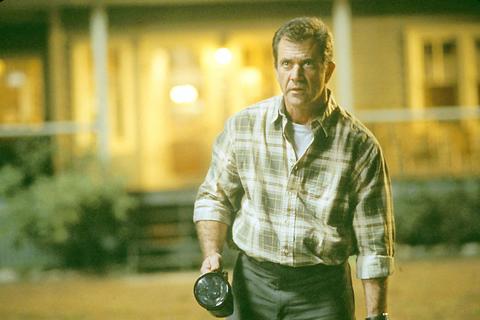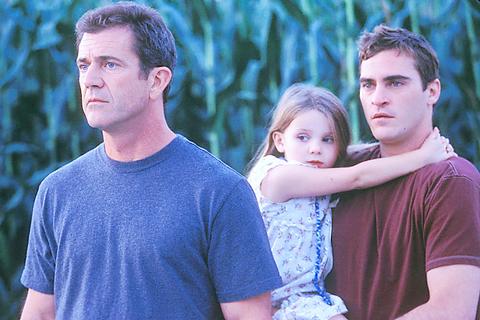Gaining his reputation for the psycho-thriller ghost story The Sixth Sense, M. Night Shaymalan has an ability to make a Hollywood genre film look unconventional. The Sixth Sense tells about the afterlife, about ghosts and people's inner spiritual world. It tells a story with a calm placid pace, dealing with topics containing metaphysical thoughts and with excellent acting. But all Shaymalan's special qualities seem to be draining away little by little, first in his following film, Unbreakable, and now in Signs.
Frankly, the experience of watching Signs is like a well-performed opera suddenly having its last scene dropped, or like a very intense soccer game where all shots miss and no one scores a goal. The atmosphere and the pace is still well-engaged, with awesome cinematography and the cut-in sounds and music, the performances of the actors are very capable, and tidbits in the story are interesting enough.

PHOTO: BUENA VISTA
In degrees of fear, it is still a very scary film. But the film as a whole lacks a convincing ending which draws in all the plot lines of this thrilling story.

PHOTO: BUENA VISTA
The story begins on a quiet night when Graham Hess (Mel Gibson) and his younger brother Merrill Hess (Joaquin Phoneix) are awaken by a strange noises outside their Pennsylvania house. Giant crop circles appear in their cornfield, driving the dog mad and causing Graham's two kids, Morgan (Rory Culkin) and Bo (Abigail Breslin), to become hysterical. Bo keeps telling her father that the water is contaminated and demands to change glasses. Morgan begins to notice little sounds given out in the air. He uses a baby monitor to record them.
Like in Sixth Sense, the children see eerie things first. Graham's disbelief results partly from his recent grief. His wife, was killed in a car accident in the woods and afterwards he leaves his reverend position, feeling that "You are always on your own. There are no signs, no someone up there watching you."
As more and more oddities take place that even the cautious, reserved sheriff feels are fishy, the story moves into the second phase. There are the unusual, radar-proof lights appearing in the air of many cities in the world, and of course the crop circles. And then TV news broadcasts show a home video image of the alien, who walks creepily past an alley in Brazil, which shocks Merrill, who becomes obsessed with TV updates about aliens, as well as us, the audience, in front of silver screen.
Another nerve-gripping scene in the film is when Mel Gibson tries to see what the green-faced alien, who is locked in a room, looks like. He uses a knife, placing it on the threshold to see the alien's reflection. But suddenly...
Director M. Night Shaymalan did not intend to explain why and how the aliens come to Earth, nor how the world prepares to fight against them, so the film doesn't present itself to be another Independence Day or Mars Attack. Instead, it deals with people's minds, with each person's faith in the face of what looks to be doomsday.
"They will read our minds," the two kids and the uncle believe. They begin wearing funny hats made of aluminum foil to protect their heads. Here it's especially about Graham's faith in himself and the world.
What follows is a final show down, a human-alien fight in the small dark cellar and living room -- but perhaps it is the biggest flaw in the film. The scene is really not fascinating enough for the audience to forget about previous puzzles; about the alien, and about the reverend's faith, the accident involving his wife, and those crop circles.

June 2 to June 8 Taiwan’s woodcutters believe that if they see even one speck of red in their cooked rice, no matter how small, an accident is going to happen. Peng Chin-tian (彭錦田) swears that this has proven to be true at every stop during his decades-long career in the logging industry. Along with mining, timber harvesting was once considered the most dangerous profession in Taiwan. Not only were mishaps common during all stages of processing, it was difficult to transport the injured to get medical treatment. Many died during the arduous journey. Peng recounts some of his accidents in

“Why does Taiwan identity decline?”a group of researchers lead by University of Nevada political scientist Austin Wang (王宏恩) asked in a recent paper. After all, it is not difficult to explain the rise in Taiwanese identity after the early 1990s. But no model predicted its decline during the 2016-2018 period, they say. After testing various alternative explanations, Wang et al argue that the fall-off in Taiwanese identity during that period is related to voter hedging based on the performance of the Democratic Progressive Party (DPP). Since the DPP is perceived as the guardian of Taiwan identity, when it performs well,

The Taiwan People’s Party (TPP) on May 18 held a rally in Taichung to mark the anniversary of President William Lai’s (賴清德) inauguration on May 20. The title of the rally could be loosely translated to “May 18 recall fraudulent goods” (518退貨ㄌㄨㄚˋ!). Unlike in English, where the terms are the same, “recall” (退貨) in this context refers to product recalls due to damaged, defective or fraudulent merchandise, not the political recalls (罷免) currently dominating the headlines. I attended the rally to determine if the impression was correct that the TPP under party Chairman Huang Kuo-Chang (黃國昌) had little of a

At Computex 2025, Nvidia CEO Jensen Huang (黃仁勳) urged the government to subsidize AI. “All schools in Taiwan must integrate AI into their curricula,” he declared. A few months earlier, he said, “If I were a student today, I’d immediately start using tools like ChatGPT, Gemini Pro and Grok to learn, write and accelerate my thinking.” Huang sees the AI-bullet train leaving the station. And as one of its drivers, he’s worried about youth not getting on board — bad for their careers, and bad for his workforce. As a semiconductor supply-chain powerhouse and AI hub wannabe, Taiwan is seeing